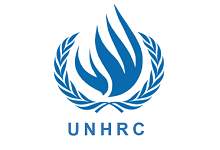UN Human Rights Council regular session | 13 September - 11 October 2021

date: 19/12/2021
The resolution acknowledges that climate change and environmental degradation have a negative impact on millions of people across the world, particularly the most vulnerable segments of the population and that “the protection of the environment, including ecosystems, contribute to and promote human well-being and the enjoyment of human rights, including the rights to life, to the enjoyment of the highest attainable standard of physical and mental health, to an adequate standard of living, to adequate food, to housing, to safe drinking water and sanitation and to participation in cultural life, for present and future generations”.
For the first time, this resolution recognises the right to a clean, healthy and sustainable environment as a human right that is important for the enjoyment of human rights; and reaffirms that States have the obligation to respect, protect and promote human rights, including in all actions undertaken to address environmental challenges. It affirms that the promotion of this right “requires the full implementation of the multilateral environmental agreements under the principles of international environmental law,” and encourages States to adopt policies for the enjoyment of the right to a clean, healthy and sustainable environment as appropriate, including with respect to biodiversity and ecosystems; and to engage in capacity-building and enhanced cooperation to protect the environment and to implement this human right.
This is the culmination of years of discussions and debates within the HRC, particularly through the work of the current and previous Special Rapporteurs on human rights and the environment. In a statement following adoption of the resolution, Human Rights High Commissioner Michelle Bachelet stressed that “the Human Rights Council’s decisive action in recognising the human right to a clean, healthy and sustainable environment is about protecting people and planet – the air we breathe, the water we drink, the food we eat. It is also about protecting the natural systems which are basic preconditions to the lives and livelihoods of all people, wherever they live”. She also stressed the need to “move beyond the false separation of environmental action and protection of human rights. It is all too clear,” she said, “that neither goal can be achieved without the other.”
The text of the resolution, proposed by Costa Rica, the Maldives, Morocco, Slovenia and Switzerland, was passed with 43 votes in favour, including all 9 EU Member States that are currently members of the UNHRC - Austria, Bulgaria, Czechia, Denmark, France, Germany, Italy, Netherlands and Poland, and 4 abstentions (China, India, Japan and Russian Federation). The issue will now be further considered by the UN General Assembly.
The resolution remains non-legally binding and does not articulate what the right entails, but still represents a big step forward towards the codification of this right. The HRC will continue to discuss the subject and has in parallel also created the figure of a new Special Rapporteur on Climate and Human rights (resolution 48/14).For more details, read more:
